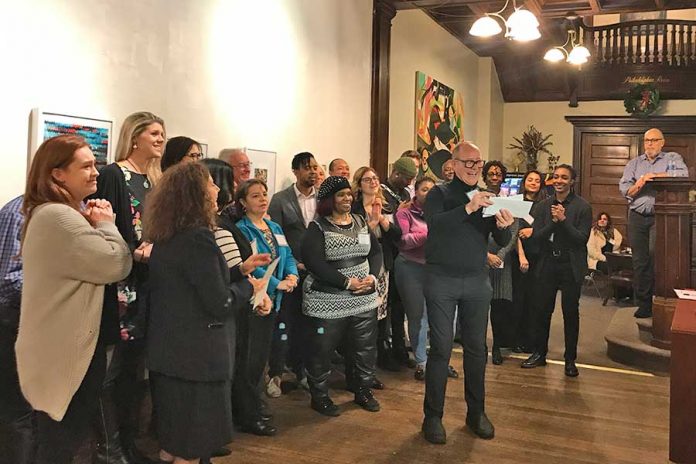Philly AIDS Thrift awarded grants to 26 Philadelphia HIV/AIDS and social service organizations in a ceremony held at the William Way LGBT Community Center on Feb. 6. This year’s grants totaled $298,750, putting the philanthropic thrift store’s total grant donations at over $2.5 million to date.
“It took us several years to give much away in our early days. Now we do that much and more every single year. It just reminds me how small we started out and far we’ve come. The best thing is to be able to present the checks directly to representatives of the HIV/AIDS service organizations that are the frontlines every day,” said Tom Brennan, co-founder of Philly AIDS Thrift, in a statement.
Grant recipients include ACT UP, Congreso de Latinos Unidos, Inc., The COLOURS Organization, Mazzoni Center, Philly Black Pride, Bebashi Transition to Hope, Action Wellness, LGBT Elder Initiative, William Way, RHD Morris Home, Safehouse, El Comite de Apoyo a Los Trabajadores Agricolas, AIDS Law Project of Pennsylvania, AIM Angels in Motion, Attic Youth Center, AIDS Delaware, Camp Dreamcatcher, MANNA, Family Services of Chester and Montgomery Counties, Drexel University Camp Bright Feathers, Neighborhood United Against Drugs, Urban Affairs Coalition, Planned Parenthood Keystone, Prevention Point Philadelphia and Siloam Wellness.
Philly AIDS Thrift is incorporated as a non-profit business and is a federally recognized tax-exempt charitable organization that allocates proceeds from its shop to local organizations working to provide medical care, resources and support systems for people living with HIV/AIDS.
“As the disease [progresses,] people are seeing there are less grant opportunities because people think it’s over,” said Michael Byrne, Philly AIDS Thrift board chair. “Not only is it not over, but the organizations that serve the people that are in most need, are the ones that have the [least] opportunity to receive funding.”
Roughly 19,147 people are living with HIV in Philadelphia, according to the data site AIDSVu.
The team at Philly Black Pride plans to use their grant funds in part to screen films about Black LGBTQ people in order to educate community members about their stories.
“It’s something that is dear to my heart because I am a self-published author, I try to infuse a lot of Black LGBT characters in my stories as well,” said Philly Black Pride Board Member Jarrod King. “I think that’s important to have that representation for the community.”
The members of the organization also hope to institute new ways of educating people about HIV rather than the typical conversations that have become repetitive and banal, said Philly Black Pride President Le Thomas.
Thomas plans to organize a “Cycle and Fit” brunch, “where we’re going to focus on the body from the inside out and look at HIV from that point, and focus on mental health and wellness that would explain some of the rises in HIV,” he said. “We seem to forget that part of the conversation around where people are mentally as to why they do the things they do in terms of sex.”
The Philadelphia iteration of ACT UP, which strives to eradicate the AIDS crisis via direct action, plans to use its grant money to further its campaigns, including those focused on housing and safe injection sites. The coalition also plans to “start building power in the queer, LGBTQ community of color,” said ACT UP organizer José de Marco. He has begun to do this by teaming up with other queer people of color to organize a conference geared toward Black and Brown people living with HIV/AIDS.
De Marco also discussed the importance of funding AIDS activist groups like ACT UP, especially under the Trump administration.
“Food stamps are being cut, disability is being cut, Medicare, Medicaid,” de Marco said. “It’s going to generate more HIV, especially in poor communities. They’re rolling back all the protections that a lot of queer people do have. We’re going to have to have a lot of activism … it’s about getting in the street and demanding what we need to live.”
Bebashi Transition to Hope, an organization that offers healthcare, HIV/AIDS care, health education and social services, plans to use its grant to enrich its HYPE program and Trans Necessities Closet, which provide HIV resources to LGBTQ people of color.
The folks at Bebashi are also focusing on hunger relief efforts. They plan to expand their North Philadelphia food pantry, one of the largest in the area, to be a client choice model, “so it’s more of a shopping experience versus a food pantry experience,” explained Amanda Finnell, Bebashi’s director of development.
“Philly AIDS Thrift has been such a core community funder for such a long time, and we’re so thankful to have them,” she added.
Mazzoni Center staff applied for a Philly AIDS Thrift grant via The Trip Project, formerly known as The Real Impact Project. Christiawn Wilson, the project’s community health engagement coordinator, plans to use the funds to hire another intern to help boost the number of folks who get tested and expand the project’s reach to communities that may not have previously been on their radar.
“That’s one of the biggest pieces about why it was important to have this internship, to provide someone in the community an opportunity to be able to give back,” Wilson said. “But give back in a way that they probably would never be able to.”
One of the main services that The Trip Project provides is weekly drop-in sessions every Tuesday called The Freedom Space, where Black and Brown queer people can be their most authentic selves. Wilson organizes a different activity every week, including a vogue night, a video discussion, education and networking sessions and topic-driven open forums.
“Grant opportunities like this, I hope they continue to happen,” Wilson said. “I’m grateful that we got it, I just want to make sure other people know that it’s available.”

